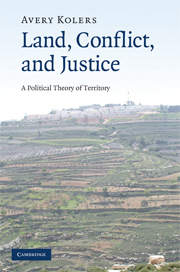Crossref Citations
This Book has been
cited by the following publications. This list is generated based on data provided by Crossref.
Lægaard, Sune
2010.
What is the Right to Exclude Immigrants?.
Res Publica,
Vol. 16,
Issue. 3,
p.
245.
Elden, Stuart
2010.
Land, terrain, territory.
Progress in Human Geography,
Vol. 34,
Issue. 6,
p.
799.
Heins, Volker
2012.
Three Meanings of Equality: The ‘Arab Problem’ in Israel.
Res Publica,
Vol. 18,
Issue. 1,
p.
79.
Miller, David
2012.
Territorial Rights: Concept and Justification.
Political Studies,
Vol. 60,
Issue. 2,
p.
252.
Kolers, Avery
2012.
Attachment to Territory: Status or Achievement?.
Canadian Journal of Philosophy,
Vol. 42,
Issue. 2,
p.
101.
Kolers, Avery
2012.
Justice, Territory and Natural Resources.
Political Studies,
Vol. 60,
Issue. 2,
p.
269.
Kohn, Margaret
2013.
What is wrong with gentrification?.
Urban Research & Practice,
Vol. 6,
Issue. 3,
p.
297.
Germain, Alexandre
2013.
Sortir le territoire de sa logique exclusive.
Philosophiques,
Vol. 39,
Issue. 2,
p.
435.
Nine, Cara
2013.
Environmental Philosophy: The Art of Life in a World of Limits.
Vol. 13,
Issue. ,
p.
137.
BLOMFIELD, MEGAN
2013.
Global Common Resources and the Just Distribution of Emission Shares*.
Journal of Political Philosophy,
Vol. 21,
Issue. 3,
p.
283.
Moore, Margaret
2013.
Place-related attachments and global distributive justice.
Journal of Global Ethics,
Vol. 9,
Issue. 2,
p.
215.
Ypi, Lea
2013.
Territorial Rights and Exclusion.
Philosophy Compass,
Vol. 8,
Issue. 3,
p.
241.
Seymour, Michel
2013.
Peuples et territoires.
Philosophiques,
Vol. 39,
Issue. 2,
p.
353.
Kolers, Avery
2014.
Reply to Armstrong.
Political Studies,
Vol. 62,
Issue. 1,
p.
223.
Hendrix, Burke A.
2014.
Historical Injustice, Rawlsian Egalitarianism, and Political Contestation.
Canadian Journal of Law & Jurisprudence,
Vol. 27,
Issue. 1,
p.
73.
St-Louis1, Jean-Charles
2014.
État(-nation), citoyenneté et contingence.
Politique et Sociétés,
Vol. 33,
Issue. 2,
p.
89.
Armstrong, Chris
2014.
Resources, Rights and Global Justice: A Response to Kolers.
Political Studies,
Vol. 62,
Issue. 1,
p.
216.
Espejo, Paulina Ochoa
2014.
People, Territory, and Legitimacy in Democratic States.
American Journal of Political Science,
Vol. 58,
Issue. 2,
p.
466.
Schuppert, Fabian
2014.
Beyond the national resource privilege: towards an International Court of the Environment.
International Theory,
Vol. 6,
Issue. 1,
p.
68.
Nine, Cara
2014.
When affected interests demand joint self-determination: learning from rivers.
International Theory,
Vol. 6,
Issue. 1,
p.
157.





